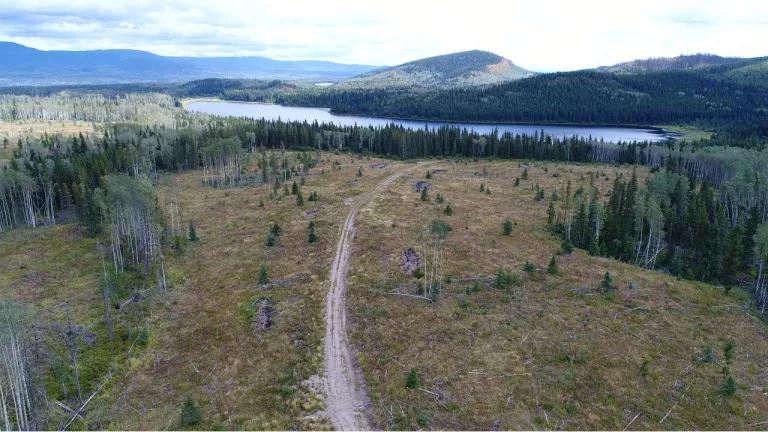Biden Administration Starts to Restore Protections for Alaska’s Tongass National Forest
The move would reverse one of Trump’s numerous environmental rollbacks, which had opened half of this pristine wilderness to industry.

View from the top of Harbor Mountain toward Baranof and Kruzof islands, near Sitka, Alaska, in the Tongass National Forest
UPDATE: On July 15, 2021, the Biden administration took a critical step toward reasserting U.S. climate leadership and finally recognizing that Southeast Alaska has long since moved on from destroying old-growth forests to support itself. In a long overdue step, the U.S. Department of Agriculture proposed robust consultation and partnership with Indigenous communities to determine a sustainable future for the region. It is essential that the administration follow through on this necessary component of any action to protect the area's natural resources. Additionally, USDA is proposing to fully restore Roadless Rule protections and end large-scale old growth timber sales on the Tongass National Forest. In tandem, it is also proposing a $25 million investment in sustainable economic opportunities, with particular focus on investments that are responsive to Indigenous needs.
In welcome news for Native tribes, the climate, wildlife, and local businesses, the Biden administration began a much-needed process to reinstate critical protections for Alaska’s Tongass National Forest.
The swath of coastal temperate rainforest had been under attack by Trump’s U.S. Forest Service, which, at the eleventh hour, exempted more than half of the Tongass from the Roadless Rule, a Clinton-era law that prevents logging, road-building, and similarly destructive development on tens of millions of acres of forest wildlands across the country.
“This is the first step toward saving America’s last big rainforest, which is vital and precious to Alaska Native tribes, fish, and wildlife,” says Niel Lawrence, Alaska director for NRDC. “We're counting on the Biden team to follow through and restore full protection to Tongass wildlands. That would show true leadership on climate and our public lands heritage. And it would hugely benefit the recreation, tourism, and commercial fishing industries that are the region’s economic lifeblood.” NRDC, alongside Earthjustice, represents a coalition of Indigenous groups, local businesses, and other environmental organizations that quickly sued the Trump administration in an attempt to block the rollback. The case has been on hold while the Biden administration decides how to proceed.

Hoonah, Alaska, the largest Tlingit village in Alaska
Native Alaskan communities—including the Tlingit, Haida, and Tsimshian people—have relied on the intact forest for food and medicine and to sustain traditional ways of life for millennia. “The Tongass national forest needs to be protected, and the Roadless Rule needs to be reinstated,” says Joel Jackson, president of the Organized Village of Kake, a federally recognized tribe and lead plaintiff in the lawsuit. “Our way of life depends on an intact old-growth forest. Our customary and traditional use of the Tongass is vital to our people.”
Home to iconic species like the Alexander Archipelago wolf and all five species of Pacific salmon, the Tongass also features the highest density of brown bears and nesting bald eagles in North America.

The Tongass National Forest features the highest density of nesting bald eagles and brown bears in North America.
Protecting this massive forest’s old-growth trees is also critical climate policy: The Tongass is a dense carbon sink, storing more carbon per acre in its centuries-old trees than almost any other forest on the planet. Deforestation and degradation of the trees and soil would release massive amounts of carbon into the atmosphere, fueling the climate crisis.
“The Tongass is a place of both majestic beauty and great importance to Native Alaskans—it’s irreplaceable,” Lawrence says. “The Biden administration must swiftly restore full protection to the forest's wildlands and all they support. This is one of the last places on Earth we can allow to be destroyed for the sake of logging profits.”


